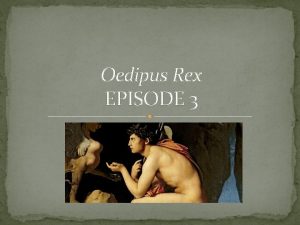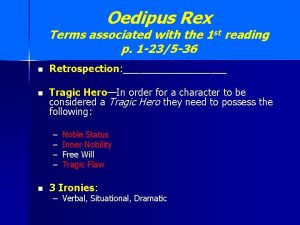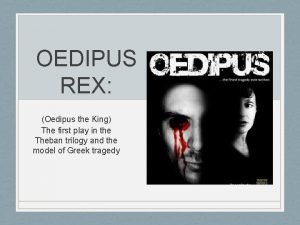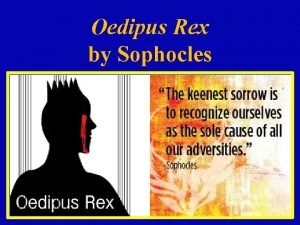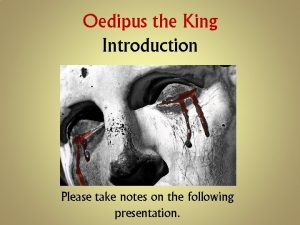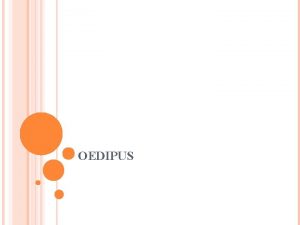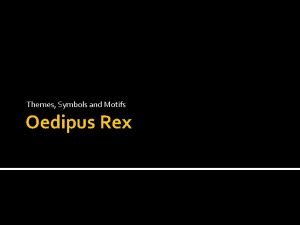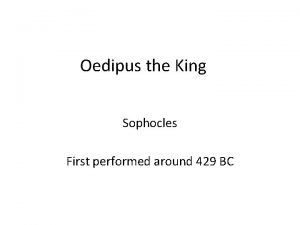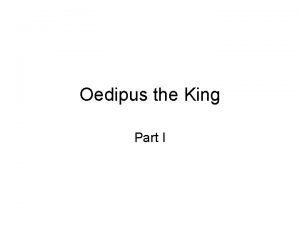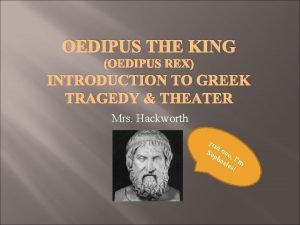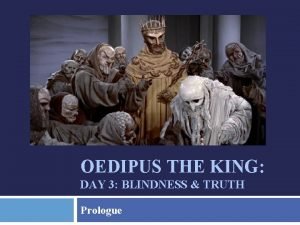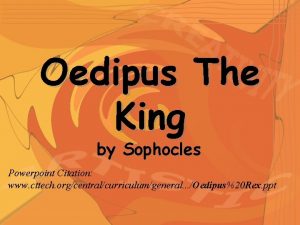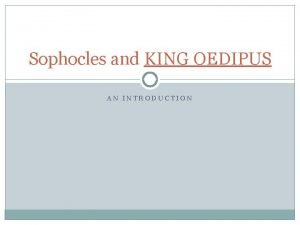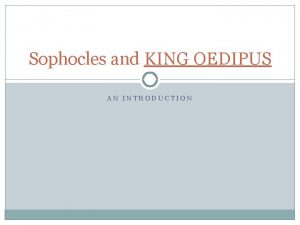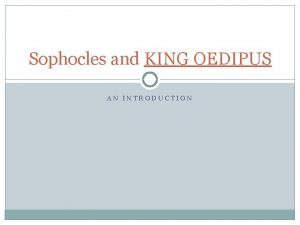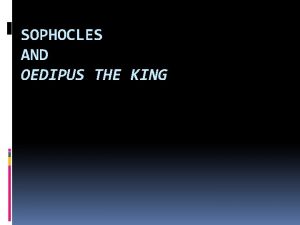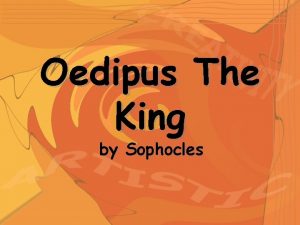Sophocles and KING OEDIPUS AN INTRODUCTION Sophocles 496












- Slides: 12

Sophocles and KING OEDIPUS AN INTRODUCTION

Sophocles 496 B. C. -406 B. C. Greek playwright and poet Wrote tragedies Wrote Theban plays (The Oedipus Cycle) Concern the fate of Thebes during and after the reign of King Oedipus Introduced third actor Reduced importance of the chorus Group of minor actors who provide background and summary information to help the audience follow the performance

Thebes Ancient city in Greece Setting for many tragedies, including Sophocles’

Elements of Tragedy • UNITIES • TERMS: ASPECTS OF TRAGEDY • THEMES • TRAGIC HERO

Three Unities Unity of action- play has one main action it follows Unity of time- play takes place within 24 hours Unity of place- play takes place within one physical space

Terms: Aspects of Tragedy in Greek Drama Crisis of feeling - painful or harmful experience that may upset or depress the audience. Catharsis - the audience cleanses their emotions. For example, they may feel uplifted. Reversal - the hero/heroine goes through a significant change in fortune for the worse. Reversal may happen after a discovery of something previously unknown to the hero/heroine.

Themes Blindness vs. sight Self-knowledge Pride Truth Responsibility Fate/destiny vs. choice

Aspects of the Greek Tragic Hero Tragic hero/heroine - the protagonist, or main character, in the play. He/she must be of noble birth or hold an important social position He/she is generally good and has a desire to do well He/she dies in the end of the play

Aspects of the Greek Tragic Hero The hero/heroine seems "better" than the other character(s), but there is a fate which overpowers this "good" character. Poor judgment by the hero causes a fall from grace and social ranking. Poor judgment is a tragic flaw, or error, called hamatria. It leads to personal catastrophe and unintended harm to others. Hubris, which means excessive pride or arrogance, is the most common type of hamatria. A hero/heroine's misfortune is an example of human fallibility (human's tendency to fail). Audience fears and pities character- punishment does not fit crime

Oedipus Rex is a play written by Sophocles that is divided into certain sections. Prologos/Prologue: an introduction or preface, especially a poem recited to introduce a play Parados: is a song sung by a Greek chorus as it first enters theater. It is named for the corridors at the front of the stage of a Greek theater from which the Chorus enters. Episodes: a section of a classic Greek tragedy that occurs between the two choric songs

Oedipus Rex continued Stasimon (Choral Ode): A classical Greek poem that has a three part structure consisting of a strophe, antistrophe and an epode. Strophe: first section of the stasimon (choral ode) Antistrophe: second section of the stasimon (choral ode) Epode: third section of the stasimon (choral ode) Exodus: In Greek Drama, this is the final scene; in tragedy, it is the action following the final stasimon (choral ode); in comedy it is the final rejoicing following the last episode.

Oedipus Rex continued Chorus: The Chorus of Theban Elders in Oedipus Rex are on stage at all times on a lower level from the principal actors. Since there is no curtain in Greek theatre, their choral odes and dances serve to separate one scene from another. this chorus also serves as commentators upon the action, interpreters of situations, and reinforces of emotion. Choragos: leader of the Chorus, speaks as a character himself. Reinforces emotion Acts as a character Interpreter of situation Commentator upon action
 Summary of oedipus rex by sophocles
Summary of oedipus rex by sophocles Oedipus falling action
Oedipus falling action Oedipus rex episode 3 summary
Oedipus rex episode 3 summary What is the summary of oedipus rex?
What is the summary of oedipus rex? English summary
English summary Oedipus notes
Oedipus notes Sight in oedipus rex
Sight in oedipus rex Themes for oedipus rex
Themes for oedipus rex Oedipus the king family tree
Oedipus the king family tree Oedipus the king, part i
Oedipus the king, part i Antigone family tree
Antigone family tree Oedipus the king themes
Oedipus the king themes Oedipus the king citation
Oedipus the king citation
